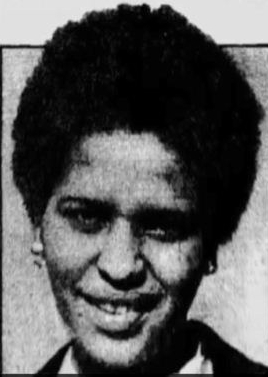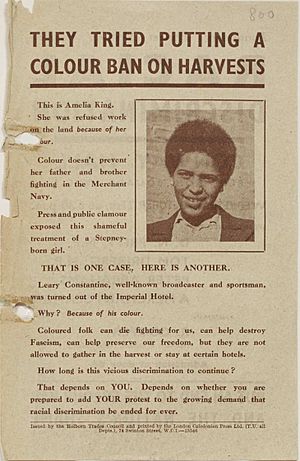Amelia King facts for kids
Quick facts for kids
Amelia King
|
|
|---|---|
 |
|
| Born |
Amelia Elizabeth King
June 25, 1917 Stepney, London
|
| Died | 1995 (aged 77–78) Whitechapel, London
|
| Nationality | British |
| Citizenship | British |
Amelia King (1917–1995) was a British woman. She wanted to join the Women's Land Army during World War II. However, she was initially not allowed to join because she was black.
This event showed an example of racial segregation (or unfair treatment based on race) in the UK. Her case was discussed in the House of Commons, which is a part of the British Parliament. Newspapers around the world, including The Chicago Defender, wrote about her story. Because of the attention, the decision to refuse her was later changed.
Contents
Amelia King's Early Life
Amelia King was born in Limehouse, in London's East End, in 1917. Her father, Henry King, was born in Georgetown, British Guiana. He worked as a stoker, which is someone who tends a furnace, in the Merchant Navy.
Amelia's brother, Fitzherbert King, also served in the Royal Navy. Before World War II, Amelia worked making fancy boxes. In September 1943, she volunteered to join the Women's Land Army.
What Was the Women's Land Army?
During World War II, many men went away to fight. This meant there were not enough people to work on farms. The Women's Land Army was created to help. It was a group of women who worked on farms across Britain. They helped grow food and keep the country going during the war.
Facing Unfair Treatment
The Essex County branch of the Women's Land Army refused Amelia King. They said it would be hard to find a place for her to work. They believed farmers would object because of her ethnicity. This was an example of the "Colour Bar". This term was used to describe unfair rules that stopped people of color from doing certain things.
Amelia received help from the Holborn Trades Council. She then told her local Member of Parliament (MP), Walter Edwards. He raised the issue of racism within the Land Army in the House of Commons.
Public Outcry and Change
Amelia's case, along with another similar event, caused a lot of public anger. Around the same time, a famous cricketer named Learie Constantine was denied a hotel room in London. These two events brought the "Colour Bar" into sharp focus. People started talking more about racial discrimination in the UK.
Amelia King was interviewed by George Padmore for The Chicago Defender. She shared her feelings about the refusal. She said, "If I'm not good enough to work on the land, then I am not good enough to make munitions." She also pointed out that no one had ever said her father or brother were not good enough to fight for England.
Because of the public attention and protests, the decision to refuse Amelia was changed. In October 1943, Amelia King was officially able to join the Women's Land Army. She worked at Frith Farm in Fareham, Hampshire, until 1944.
Later Life
Amelia King passed away in 1995. She died at the Royal London Hospital in Whitechapel. She was 78 years old.
Images for kids



